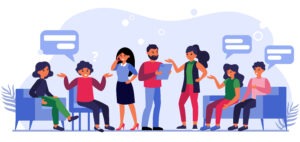Introduction:
Welcome, dear readers, to a transformative exploration of one of the most essential life skills—verbal communication. In the vibrant tapestry of life, effective communication acts as the golden thread weaving connections, understanding, and harmony. As a passionate freelance trainer, my mission is to empower individuals and organizations with the tools they need to unleash their full potential. In this article, we will delve deep into the realm of verbal communication, unlocking the secrets to confident expression and meaningful connection.
Table of Contents
1.The Power of Clarity and Confidence:

Clarity in Expression: One of the fundamental aspects of effective verbal communication is clarity. It involves articulating your thoughts in a concise and understandable manner. Start by organizing your ideas before speaking, ensuring a logical flow of information. Use simple language and avoid jargon, enabling your audience to grasp your message effortlessly. Practice active listening to understand the concerns of your conversation partner, allowing you to respond thoughtfully and directly.
Confidence Building: Confidence is the key to commanding attention and respect. To boost your confidence, practice your speech in front of a mirror or record yourself speaking. Work on your posture and gestures; a confident body language reinforces your verbal message. Additionally, embrace the power of positive affirmations to bolster your self-assurance. Remember, confidence stems from preparation and self-belief.
Thought: “Clarity in Words, Confidence in Voice: Your Pathway to Impactful Communication.”
2.Effective Verbal Persuasion:
Understanding the Audience: Every conversation involves understanding the needs, beliefs, and emotions of your audience. Effective communicators tailor their message to resonate with the listener. Empathize with their perspective, acknowledge their concerns, and address their interests. By doing so, you establish a connection that forms the basis for persuasive communication.
The Art of Persuasive Language: Words have the power to influence, inspire, and persuade. Master the art of persuasive language by incorporating rhetorical devices such as metaphors, analogies, and storytelling. These tools evoke emotions and engage the listener on a deeper level. Use positive language to create a sense of optimism and possibility, encouraging your audience to embrace your ideas willingly.
Active Listening and Responding: Active listening is a cornerstone of persuasive communication. Demonstrate genuine interest in what the other person is saying. Nod, maintain eye contact, and paraphrase their points to confirm your understanding. Respond thoughtfully, acknowledging their perspective before presenting your counterpoints. This not only validates their feelings but also opens the door for a constructive dialogue.
Thought: “Empathy in Understanding, Persuasion in Words: Influencing Minds, Inspiring Actions.”
Suggested Website Article References:
- Reference 1: https://pumble.com/blog/verbal-communication
Suggested YouTube Video Reference:
Conclusion:
In the grand tapestry of life, mastering verbal communication is akin to mastering the art of weaving, where every word and gesture contributes to the beauty of the final creation. Remember, your destiny is shaped not just by the words you speak, but how you speak them. Embrace the journey of enhancing your verbal communication skills, and witness the transformative power it holds for your personal and professional life.
Thank you for exploring this insightful article. If you’re hungry for more knowledge, don’t miss out on our other engaging articles waiting for you. Dive into our treasure trove of wisdom and discover new perspectives on related topics. Click ‘Our Blog‘ and ‘How to Guide‘ to embark on your next adventure. Happy reading!
Frequently Asked Questions (FAQs) about Mastering Verbal Communication:
Q1: Why is verbal communication important in both personal and professional contexts?
A1: Verbal communication is vital as it forms the basis for building relationships, resolving conflicts, and conveying ideas effectively. In personal life, it nurtures emotional connections, while in the professional sphere, it’s essential for teamwork, leadership, and successful negotiations.
Q2: Can anyone become proficient in verbal communication, or is it a natural talent?
A2: Verbal communication is a skill that can be developed and honed with practice and dedication. While some individuals may have a natural inclination, anyone can improve their communication abilities through learning, practice, and self-awareness.
Q3: How can I overcome nervousness or stage fright during verbal communication?
A3: Overcoming nervousness involves preparation, practice, and confidence-building techniques. Practice your speech or conversation, focus on your breathing to calm nerves, and visualize a positive outcome. With consistent effort, confidence will naturally grow.
Q4: What role does active listening play in effective verbal communication?
A4: Active listening is crucial in communication. It involves fully concentrating, understanding, responding, and remembering what is being said. By practicing active listening, you show respect, gain understanding, and foster trust in your relationships.
Q5: How can I improve my persuasive communication skills?
A5: Improving persuasive communication involves understanding your audience, crafting a compelling message, and using persuasive language effectively. Empathize with your audience, use storytelling and emotional appeal, and address their concerns to make your communication more persuasive.
Q6: Are there common mistakes people make in verbal communication, and how can I avoid them?
A6: Common mistakes include lack of clarity, poor listening, using jargon, and not considering the audience. To avoid these, focus on clear articulation, active listening, using simple language, and tailoring your message to the audience’s level of understanding.
Q7: How can I adapt my verbal communication style for different situations or cultures?
A7: Adapting your communication style involves being aware of cultural differences and adjusting your tone, language, and gestures accordingly. Respect cultural norms, be open-minded, and be willing to learn about different communication styles to foster understanding and harmony.
Q8: What resources can I explore to further enhance my verbal communication skills?
A8: There are numerous resources available, including books, online courses, workshops, and public speaking clubs like Toastmasters. Additionally, watching TED Talks, reading articles, and practicing with friends or mentors can significantly contribute to improving your verbal communication skills.
Q9: How long does it take to see improvement in verbal communication skills with consistent practice?
A9: Improvement varies from person to person and depends on the individual’s starting point and dedication. With consistent and focused practice, noticeable improvements can often be seen within a few weeks to months, especially when actively seeking feedback and applying new techniques.
Q10: Is it possible to communicate effectively in a language that is not my native tongue?
A10: Yes, effective communication in a non-native language is entirely possible with dedication and practice. Immersing yourself in the language, practicing with native speakers, and learning about the culture can significantly enhance your proficiency and confidence in verbal communication.


 Clarity in communication" class="wp-image-501" title="
Clarity in communication" class="wp-image-501" title="